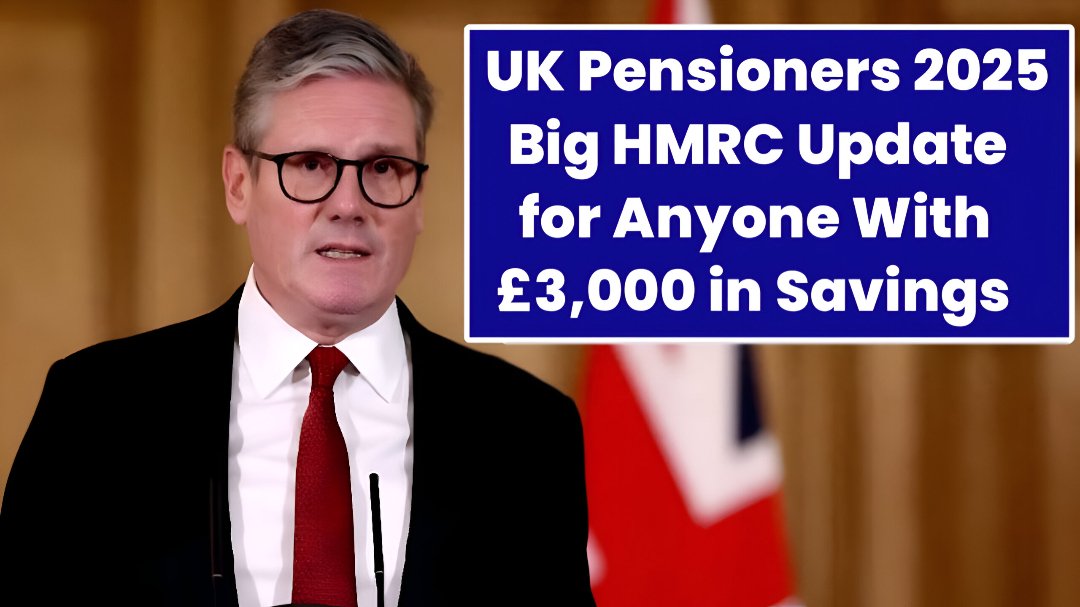As the UK enters 2025, HMRC has issued an important update for pensioners regarding savings, tax thresholds, and eligibility for certain benefits. One of the most talked-about changes concerns those with as little as £3,000 in savings. For many retirees living on fixed incomes, even a modest adjustment could have a significant impact.
This guide breaks down what the HMRC update means, how it could affect your pension income, and what steps pensioners should take to stay compliant while maximising their entitlements.
Why HMRC Has Issued New Pension Rules for 2025
The UK government regularly reviews pension and savings thresholds to reflect inflation, public spending needs, and demographic changes. HMRC’s latest update focuses on clarifying how small savings pots — often around £3,000 — interact with pension entitlements, taxable income, and benefits.
The aim is to ensure pensioners are treated fairly while also preventing unreported income from savings accounts or investments. With interest rates fluctuating in recent years, even modest savings balances can generate income that falls under HMRC’s radar.
What the £3,000 Savings Rule Actually Means
The new HMRC guidance highlights that pensioners with £3,000 in savings may see changes in how their benefits and allowances are calculated. While £3,000 may seem like a small amount, it can affect:
- Pension Credit eligibility – Savings above certain levels are factored in as “assumed income”.
- Taxable savings interest – Any interest earned, even on small balances, must be declared if it pushes income above the tax-free allowance.
- Interaction with other benefits – Council Tax Reduction, Housing Benefit, and other local support schemes may count savings in their assessments.
In other words, HMRC is ensuring that pensioners with modest savings are both aware of their obligations and not missing out on entitlements.
How Pension Credit is Affected by £3,000 in Savings
Pension Credit remains one of the most vital top-up benefits for low-income pensioners in the UK. However, savings rules apply. Currently, if you have savings above £10,000, HMRC assumes a notional income of £1 per week for every £500 saved.
With £3,000, you’re below that threshold — which is positive news. But HMRC’s new update suggests that smaller balances will be more carefully monitored, ensuring accuracy when pensioners claim support. For those hovering around £3,000 to £5,000 in savings, this could make a real difference.
The Savings Allowance and Tax Implications
For most pensioners, the Personal Savings Allowance provides tax relief on savings interest:
| Taxpayer Status | Tax-Free Savings Interest (per year) |
|---|---|
| Basic Rate (20%) | £1,000 |
| Higher Rate (40%) | £500 |
| Additional Rate (45%) | £0 |
If you are a basic rate taxpayer with £3,000 in a savings account, your interest will likely fall well within the £1,000 allowance. But HMRC stresses that even if you think you are under the threshold, reporting requirements still apply. Transparency is key to avoiding penalties.
Why This Matters for UK Pensioners
The significance of the £3,000 figure is not about the amount itself, but the principle behind it. HMRC is effectively signalling:
- Every penny of income counts when assessing benefits and tax.
- Small savings balances are no longer ignored in entitlement checks.
- Pensioners should be proactive in declaring savings income, even if minor.
For retirees on limited budgets, clarity in these rules ensures they receive the right support while avoiding unexpected deductions or overpayments.
Practical Steps Pensioners Should Take
If you’re a UK pensioner with savings around £3,000, here are some steps you can take in 2025:
- Check your bank statements – Monitor savings interest and note annual totals.
- Use HMRC’s digital services – The online Personal Tax Account can help track income.
- Confirm Pension Credit eligibility – Even small changes in savings can affect claims.
- Seek advice early – Citizens Advice and Age UK can provide free, trusted guidance.
- Report promptly – If your savings change significantly, update HMRC and DWP straight away.
Could Pensioners Lose Out in 2025?
There’s no suggestion that HMRC wants to penalise those with modest savings. In fact, many campaigners argue that highlighting £3,000 in savings is a reassurance to pensioners that their nest egg will not automatically disqualify them from support.
However, failing to declare even small amounts could lead to repayment demands later. That’s why the new rules act as a reminder: honesty and accuracy protect your pension income.
Wider Context: Rising Living Costs
This HMRC update also comes against a backdrop of rising household bills, council tax increases, and higher living costs. Pensioners in the UK often rely on careful budgeting, and savings provide a crucial safety net.
By clarifying the role of modest savings, HMRC hopes to strike a balance between fairness and financial responsibility. Pensioners who manage their finances carefully should feel reassured, not threatened, by the changes.
Final Thoughts
The HMRC update for 2025 regarding pensioners with £3,000 in savings is less about introducing new penalties and more about ensuring transparency. For most retirees, the impact will be minimal — but it’s an important reminder to declare all savings income and stay within the rules.
For pensioners worried about their entitlements, the key takeaway is this: £3,000 in savings will not disqualify you from support, but you must stay informed and proactive in reporting income.
